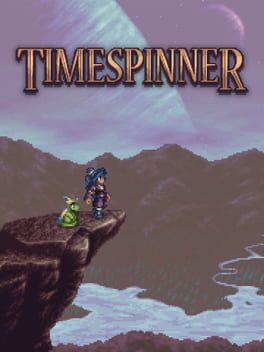This review contains spoilers
Timespinner is a game that's unabashedly queer.
One side character is a trans woman. Polyamory is normalized. A monarch in a position of power we meet is a lesbian. Our main protagonist flirts with characters of all genders. It's something that is in every facet of it - the DNA of this game is queerness. While it's not particularly complex or compelling queerness - the characters are simply queer, the narratives surrounding them are not - it's a nice comfort at least.
What confuses me about this, though, is the story and ideas surrounding all of this. Timespinner is ostensibly a game about imperialism and colonialism, and how those systems destroy lives and perpetuate a never ending cycle. The monarchy which you set out to destroy at the beginning of the game, as it turns out, was created by the oppression of another monarchy one thousand years before. An ouroboros of systemic violence.
It's a pretty standard and accurate depiction of how these political structures sustain themselves. The cycles of violence that fuel empire. However, I don't understand why, through the game's analysis of race relations under these systems, it doesn't do anything meaningful with queerness. Queer characters simply exist. I can see the appeal in that. But when we talk about colonialism and queerness, it's hard for me to ignore the elephant in the room of how colonialism has consistently erased queer identities throughout history. This game ignores that there is any meaningful connection at all.
Adding onto its strange relationship with its own subject matter, the game does indulge in some fantasy racism. The demons are considered unequivocally evil, and a lot of time is spent on how they're the reason behind the previously colonized kingdom becoming the new colonizer. It was their use of demonic forces, the game argues, that led to their downfall. I'm not sure that I have to explain an entire sentient species being completely evil is an awful narrative choice in a game that's about the subjugation of groups of people. It's an awful narrative choice in almost any context, but here it echoes the propaganda that this game is attempting to criticize.
It ultimately ends up being a very conflicted experience. It seems to only wish to tackle the subjects it covers in very broad strokes.
For stories like this, we need a finer painter.
One side character is a trans woman. Polyamory is normalized. A monarch in a position of power we meet is a lesbian. Our main protagonist flirts with characters of all genders. It's something that is in every facet of it - the DNA of this game is queerness. While it's not particularly complex or compelling queerness - the characters are simply queer, the narratives surrounding them are not - it's a nice comfort at least.
What confuses me about this, though, is the story and ideas surrounding all of this. Timespinner is ostensibly a game about imperialism and colonialism, and how those systems destroy lives and perpetuate a never ending cycle. The monarchy which you set out to destroy at the beginning of the game, as it turns out, was created by the oppression of another monarchy one thousand years before. An ouroboros of systemic violence.
It's a pretty standard and accurate depiction of how these political structures sustain themselves. The cycles of violence that fuel empire. However, I don't understand why, through the game's analysis of race relations under these systems, it doesn't do anything meaningful with queerness. Queer characters simply exist. I can see the appeal in that. But when we talk about colonialism and queerness, it's hard for me to ignore the elephant in the room of how colonialism has consistently erased queer identities throughout history. This game ignores that there is any meaningful connection at all.
Adding onto its strange relationship with its own subject matter, the game does indulge in some fantasy racism. The demons are considered unequivocally evil, and a lot of time is spent on how they're the reason behind the previously colonized kingdom becoming the new colonizer. It was their use of demonic forces, the game argues, that led to their downfall. I'm not sure that I have to explain an entire sentient species being completely evil is an awful narrative choice in a game that's about the subjugation of groups of people. It's an awful narrative choice in almost any context, but here it echoes the propaganda that this game is attempting to criticize.
It ultimately ends up being a very conflicted experience. It seems to only wish to tackle the subjects it covers in very broad strokes.
For stories like this, we need a finer painter.
